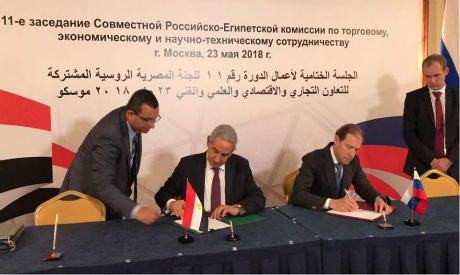
Egypt and Russia signed an agreement to establish a Russian Industrial Zone in the Suez Canal Economic Zone (Photo Courtesy of the Egyptian Ministry of Trade and Industry)
Egypt’s Minister of Trade and Industry Tarek Kabil and his Russian counterpart Denis Manturov signed on Wednesday in Moscow an agreement to establish a Russian industrial zone in the Suez Canal Economic Zone.
The zone, set to attract $7 billion in investments, will be located in East Port Said.
The 50-year agreement will be automatically renewed for five consecutive years if both sides agree.
The agreement's signing came at the plenary session of the 11th Joint Russian-Egyptian Intergovernmental Commission on Trade-Economic, Industrial and Scientific and Technological Cooperation in Moscow.
“The signing of the agreement to establish the Russian Industrial Zone in Egypt will contribute to an unprecedented leap in the level of industrial and investment cooperation between Egypt and Russia in the coming period,” Minister Kabil said in a statement.
As per the agreement, both sides will cooperate in manufacturing competitive products that cater to the needs of the Egyptian market as well as foreign markets.
“This will make Egypt a hub to export Russian products to all international markets, especially the Middle East and Africa,” the statement read.
The Russian industrial zone is set to be established over three phases on a 5.25 million square-meter plot of land, with the first phase to cost $190 million.
Land in the industrial zone, which is expected to generate 35,000 jobs, will be offered to investors on a usufruct basis.
Egypt and Russia will also cooperate in offering training to experts in various industrial sectors, will exchange expertise in establishing and managing industrial zones, and will provide service for companies who will invest in the zone.
The General Authority of the Suez Canal Economic Zone will be responsible for providing geological and geographical data for the zone’s location, which is necessary for the establishment of the infrastructure and utilities.
The Authority will provide a one-stop shop to offer licenses, permits and legal consulting and will be responsible for providing the zone with the necessary infrastructure to access roads, ports, railway, as well as electricity and gas.
Russian research, development and construction companies will contribute to establishing and operating the zone.
The Russian government will prepare the main plan for the zone in cooperation with the Egyptian government, including the most efficient infrastructure solutions, Minster Manturov said.
The Russian side will also work on attracting investments to the zone and managing the manufacturing process, offering services in the zone, and bringing in Russian equipment and technology.
Negotiations over the zone had been ongoing since 2014.
An MoU was signed between the two countries in February 2016 to establish the project.
The Egyptian government approved in March the preliminary agreement to establish the zone.
Egyptian-Russian bilateral trade reached a record $3.8 billion in 2017, Minister Kabil announced on Wednesday.
Kabil also announced that Egypt and the Eurasian Economic Union will begin the first round of talks on a free trade agreement in September in order to boost trade and economic ties.
Bilateral trade between Egyptian and the Eurasian Economic Union was valued at $6.9 in 2017, Kabil said.
Topics discussed at the session included the implementation of the Dabaa nuclear power plant, providing 13,000 passenger cars for the Egyptian national railway, the reconstruction and modernisation of grain storage and processing facilities, and the modernisation of the Helwan metallurgical complex, the Russian-Egyptian Business Council said.
Short link: